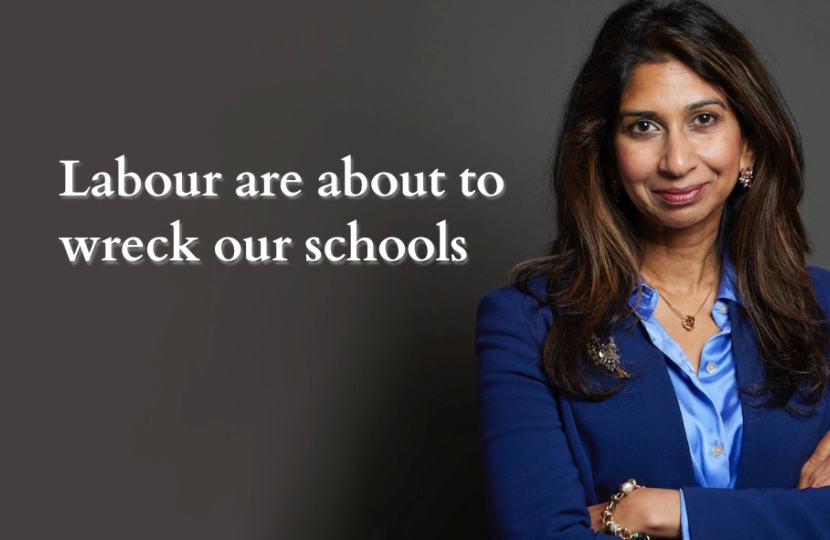
Education reform was one of the rare undoubted successes of the last Tory government. Today’s Schools Bill will undo all this work
By any measure, Labour’s favourite attack line – “You awful Tories caused the mess in the first place” – has had a good run. From net migration to tax burdens, defence spending, and the Channel crossings, it’s their go-to refrain.
And, truth be told, they’re not always wrong. I’ve been frank about our shortcomings for some time now, much to the chagrin of more defensive colleagues. Yet I can’t help but wonder how long Labour can coast on this strategy. Six months? Twelve? That’s the frustration of Opposition, I suppose.
But there’s one policy area where that line simply doesn’t wash: education. Here, the Conservatives’ record is unassailable. It is no exaggeration to say that the reforms introduced under the last government transformed the landscape of British education, leaving it in far better shape than we found it. I would go further: millions of children can read and count (when they otherwise would not) thanks specifically to the Govian reforms pioneered in office.
In 2010, the picture was bleak. British schools languished near the bottom of the OECD’s PISA league tables for literacy and numeracy. Fast forward to today, and we’ve climbed to 4th in the world for reading and 11th for maths.
That transformation is no accident. It is the result of bold, determined policy led by Sir Nick Gibb and the relentless push for phonics, rigour, and high expectations in our classrooms. Ofsted’s recent figures show that over 90 per cent of schools are now rated “good” or “outstanding”, up from just 68 per cent in 2010. This is a legacy we should champion with pride.
At the heart of this transformation was the 2011 Education Act, a piece of legislation whose importance cannot be overstated. By embedding a presumption in favour of free schools and granting greater autonomy to teachers and school leaders, the Act revolutionised how our schools operate. The result? A flourishing of excellence across the system thanks to what we termed “the rising tide of competition”.
I saw this revolution firsthand when I helped to establish Michaela Community School in Wembley. Born and raised in that very community, I knew what was at stake. With Katharine Birbalsingh’s leadership, we fought hostile local authorities, detractors, and even protesters to open our doors in 2014. I served as Chairman of Governors for the first four years when we gained our first Ofsted Outstanding Report.
Today, Michaela stands as a testament to what’s possible with the right approach: a knowledge-rich curriculum, strict discipline, and an unwavering commitment to excellence. The pupils achieve some of the best results in the country, proving that postcode need not determine potential.
And yet, Labour now threatens to undo all this progress. Their Child Wellbeing and Schools Bill, debated this week, is a regressive blueprint for mediocrity. At its core, it seeks to strip schools of the freedoms that have been pivotal to their success.
Pay, staffing, curriculum – all of this would be dragged back under Whitehall’s control, reducing accountability and stifling innovation. Most alarmingly, the Education Secretary has ruled out any new free schools, effectively slamming the door shut on future success stories like Michaela.
Even more troubling is Labour’s curriculum review, which appears less focused on excellence and more on ideological conformity. Under the stewardship of Dr Becky Francis, a specialist steeped in gender and equality studies, the curriculum review signals a march towards social engineering. Latin is to be scrapped from the state curriculum, English Literature dismissed as too “monocultural”, and traditional history teaching derided as rife with “middle-class bias.” Instead, Labour would replace visits to museums and galleries with graffiti workshops, and times tables with lessons in how to “challenge racial bias”.
This is the soft bigotry of low expectations writ large. We saw where this led before: England’s schools ranked among the worst in the developed world. Sir Nick Gibb rightly called out this approach for what it is – a betrayal of disadvantaged children who need high expectations the most. Rigour, competition, and discipline are not barriers to success; they are its foundations.
A good education should stretch every child to their full potential, equip them for the challenges of the modern world, and foster a love of learning that lasts a lifetime. It is not indoctrination, nor is it supposed to be easy. Labour’s plans risk consigning a generation of children to mediocrity – and dragging our country backwards in the process.
We must fight this. Education reform has been one of the great successes of the past decade. To let it slip away would not only be a tragedy for our children but a betrayal of our responsibility to them. The stakes are simply too high to allow ideology to triumph over excellence.
https://www.telegraph.co.uk/news/2025/01/08/labour-is-set-to-destroy-our-schools/

